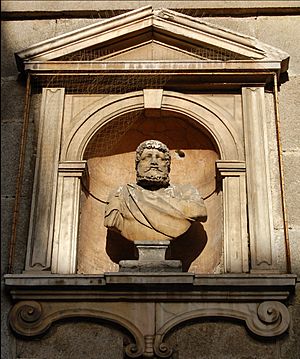Gnaeus Pompeius Strabo facts for kids
Quick facts for kids
Gnaeus Pompeius Strabo
|
|
|---|---|
| Born | c. 135 BC |
| Died | 87 BC |
| Nationality | Roman |
| Office |
|
| Children | Pompey and Pompeia |
| Military service | |
| Battles/wars | Social War Bellum Octavianum |
| Awards | Triumph |
Gnaeus Pompeius Strabo (around 135 BC – 87 BC) was an important Roman general and politician. He became a consul in 89 BC. People often call him Pompey Strabo to tell him apart from his famous son, Pompey the Great, or from Strabo the geographer.
The name Strabo means "cross-eyed." He grew up in the Roman Republic in a noble family from Picenum. This area is in central Italy, near the Adriatic Coast. His mother was Lucilia, and her family was related to the poet Gaius Lucilius. Strabo's grandfather was Gnaeus Pompeius, and his father was Sextus Pompeius. He also had an older brother named Sextus Pompeius and a sister named Pompeia.
Becoming a Roman Leader
Strabo was a leading member of the Pompeii family, which was very important in Picenum. This family became the richest and most powerful in their region. They had many supporters and a lot of influence in Picenum and in Rome. Even though some Roman leaders looked down on people from outside Rome, the Pompeii family was too powerful to ignore.
After serving in the army, probably as a military officer, Strabo began to climb the cursus honorum. This was a series of steps that Roman politicians took to gain power. He became a governor in Sicily in 93 BC. Then, in 89 BC, during the Social War, he was elected consul.
The Social War
Even though Strabo was from a region outside Rome, he and his family were Roman citizens. So, they fought for Rome during the Social War. This was a big conflict between Rome and its Italian allies. Strabo led Roman forces against the Italian rebels in northern Italy.
First, he gathered three or four legions (large groups of soldiers) from his home region of Picenum. Then, he marched them south to fight the rebels. In 90 BC, while moving his legions, he faced a surprise attack from a large group of Picentes, Vestini, and Marsi. Strabo's army was greatly outnumbered, so he decided to pull back.
He found himself trapped in Picenum. But in the autumn of 90 BC, he launched two successful attacks. These attacks caught his enemies from two sides. The remaining enemy soldiers went back to Asculum, and Strabo decided to surround the city to make them surrender.
Because of his successful attacks, Strabo became very popular. He used his fame to get elected as one of the consuls for 89 BC. His partner as consul was Lucius Porcius Cato. Strabo attacked and defeated a rebel group trying to enter Etruria, killing 5,000 rebels. Another 5,000 died trying to cross the Apennine Mountains.
Strabo's fellow consul, Lucius Porcius Cato, fought the Marsi near Fucine Lake. He died trying to attack the enemy camp. This left Strabo as the only consul. The details of the siege of Asculum are not fully clear from history. We know of a huge battle near Asculum, where Strabo defeated an Italian army of 60,000 men. Soon after, Asculum fell. Strabo punished the rebel leaders and sold their belongings. He kept the money from these sales, which made some people think he was greedy.
At the end of his time as consul, Strabo tried to become consul again for the next year, 88 BC. This was not against the law, but it was very unusual. However, he did not succeed. Instead, Lucius Cornelius Sulla and Quintus Pompeius Rufus were elected consuls.
Celebrating Victory
Strabo celebrated a triumph for his victories against the Italian Allies on December 27, 89 BC. A triumph was a grand parade to celebrate a military victory. After his time as consul ended, he went back to Picenum with his experienced soldiers. He did not send his army home but kept them ready.
The Senate soon gave command of Strabo's army to Quintus Pompeius Rufus, one of the new consuls. But when Pompeius Rufus arrived, Strabo's soldiers killed him. Strabo did not get involved when Sulla marched on and took Rome in 88 BC. He stayed in Picenum until 87 BC.
In 87 BC, the Senate asked for his help against Gaius Marius and Lucius Cornelius Cinna, who were also marching their armies toward Rome. Strabo took his army to Rome. However, he did not fully support either side. Instead, he tried to play both sides against each other. For this, a writer named Rutilius Rufus called him "the vilest man alive." When talks with the Cinna-Marian group failed, Strabo attacked Quintus Sertorius, one of Cinna's commanders, who was north of the city. But this attack was not successful.
Death
In 87 BC, Strabo and his army set up camp outside the Colline Gate near Rome. The camp was not kept clean, and many soldiers became sick. Strabo himself caught a serious illness and died a few days later in his camp. Some stories say his soldiers disliked him so much that they treated his body badly after he died. Another story says he died after being struck by lightning.
His son, Pompey the Great, took the legions back to Picenum. He would later use these soldiers to support Sulla.
Strabo had at least two children: a son, Gnaeus Pompeius Magnus (Pompey the Great), and a daughter, Pompeia. Pompeia married Gaius Memmius and later Publius Cornelius Sulla.
To honor him, two cities were named after him: Alba Pompeia and Laus Pompeia.
See also
 In Spanish: Cneo Pompeyo Estrabón para niños
In Spanish: Cneo Pompeyo Estrabón para niños
 | Georgia Louise Harris Brown |
 | Julian Abele |
 | Norma Merrick Sklarek |
 | William Sidney Pittman |


